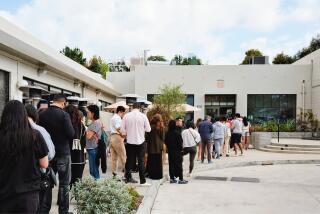Street food cred comes in the form of a yellow sticker
I’ve never been one for eating food off the street.
But this week, in pursuit of journalistic truth, I purchased a tamale — or tamal, in Spanish — from a street vendor pushing a shopping cart in South Los Angeles.
You can sell food on the street legally, with a series of business and health permits, but these days, L.A. County is taking the move to regulate food vending a step further by issuing letter grades to food trucks. Now, even hot dog, fruit and tamale vendors are getting grades.
But this tamal, wrapped in a corn husk with several strips of green chile inside, was clearly unlicensed. It was made by a woman from Acapulco, Mexico, who will never get a letter grade and who will run away if you try to give her one.
Nevertheless, her tamales were greasy and delish. They tasted authentically homemade, too, which wasn’t surprising, since she makes them in her apartment. Every weekday, she told me, she wheels around her South Figueroa neighborhood, tooting a little horn to announce her presence.
“One dollar each,” she said in Spanish. Quite a bargain.
These are the kind of people, I learned later, that drive Khaled Hassan crazy.
Hassan runs a commissary on Grand Avenue downtown that provides space to another group of vendors — licensed food-cart and food-truck operators, who chop fruit and load up on hot dogs in a sanitary county-approved kitchen before also heading out onto L.A. streets. He says he calls the health department almost every day about illegal food vendors. Sometimes he calls the LAPD.
“The people I work with pay health department fees, they pay for food-handler permits, and pay a commissary fee to me,” all of which is required by law, he said. “The people with these homemade carts are making a killing without paying for any of those things. And they’re getting away with it.”
Latino immigrants dominate the street-food trade. As Hassan sees it, he’s trying to help one group of Latino immigrant vendors stay in business despite unfair competition from another group of Latino immigrants.
An illegal vendor of hot dogs, for example, can make as much as $300 a day, Hassan said. That vendor’s licensed competitor might take in a bit more but has higher costs associated with keeping his food sanitary and has to pay ever-higher health-inspection fees.
Hassan is a daily witness to the unfairness of it all. At 7 a.m., hot dog and fruit vendors arrive at his commissary to prepare food according to health department rules. As they leave, illegal vendors start showing up on the sidewalk outside.
“When the inspectors come out, who do they spend most of their time harassing?” Hassan asked rhetorically. “The licensed vendors, of course.”
In one sense, the move to license street food is the eternal American dance: It’s taking newcomers and incorporating their unregulated energy into our system, teaching them the greater good that comes from a system of laws.
“Everyone has a right to struggle to survive,” said Felix Mena, a Mexican immigrant and licensed food-truck owner, referring to illegal vendors. “But if I made the effort to get all my permits, they should make the effort too.”
Back in the late ‘80s, Mena’s first food truck cost him $600. He sold tacos but was closed down by the health department. These days, he parks a big food truck just a few paces from Hassan’s commissary, serving breakfast, lunch and dinner legally.
In July, he got his first-ever letter grade from a health inspector: B.
“I blew it,” he told me in Spanish. “I had just gone to the market, and I had a big box of lettuce, and I left it on the ground outside.” At that instant, the inspector showed up and subtracted six points from Mena’s score.
And yet Mena, 47, is all for the new letter grades. After working in food trucks in L.A. for more than two decades, he’s internalized the logic behind health department rules. When he talks about good food-handling, the Durango, Mexico, native sounds like a full-blown American bureaucrat.
“That lady right there, she’s selling poison,” Mena told me, as a woman pushing a heavy shopping cart grunted past on Grand Avenue, preparing to sell bacon-wrapped hot dogs. “That meat needs to be refrigerated. That small stove she has probably doesn’t get hotter than 175 degrees. But if you don’t cook meat at 400 degrees, you don’t kill the bacteria.”
Mena pays a pretty penny to serve safe food to his customers. His newest truck costs as much as a small suburban condominium, and comes complete with steam tables and a fire-suppression system.
He’s determined to get an A on his next surprise inspection — to that end, he’s always got his hairnet on, and his refrigerator set to 37 degrees. When he gets that A, it will be one more symbol of his American achievement. Just like the U.S. citizenship certificate he earned in January.
Over on the other side of Grand Avenue, however, a licensed fruit vendor named Adela was just about ready to give up.
Adela, a Salvadoran immigrant, didn’t want to give me her full name — for reasons that will soon become apparent — even though she had a yellow health department sticker on her cart.
She described being stuck between two business cultures. “You try to do things right,” she told me in Spanish. “If the inspector gives me a note, then I have to go to court for it.” But following these rules has earned her the wrath of other, unlicensed vendors, she said.
“I’ve been threatened with death,” she told me, wiping tears from her face. Other vendors think Adela is the one calling the inspectors and the police, because when those officials arrive, she doesn’t have to gather her fruit and take off running.
Now, to make things worse, business has gone down the tank. “If you know of a job cooking or cleaning, let me know,” she said.
You can help out the Adelas of L.A. by shopping at carts with a county Public Health Department sticker on the side.
I bought some mango slices for $3 from her. They were succulent, sweet and tart. And unlike the unlicensed tamal I had eaten earlier, they didn’t burn and roil in my stomach.
More to Read
Eat your way across L.A.
Get our weekly Tasting Notes newsletter for reviews, news and more.
You may occasionally receive promotional content from the Los Angeles Times.







